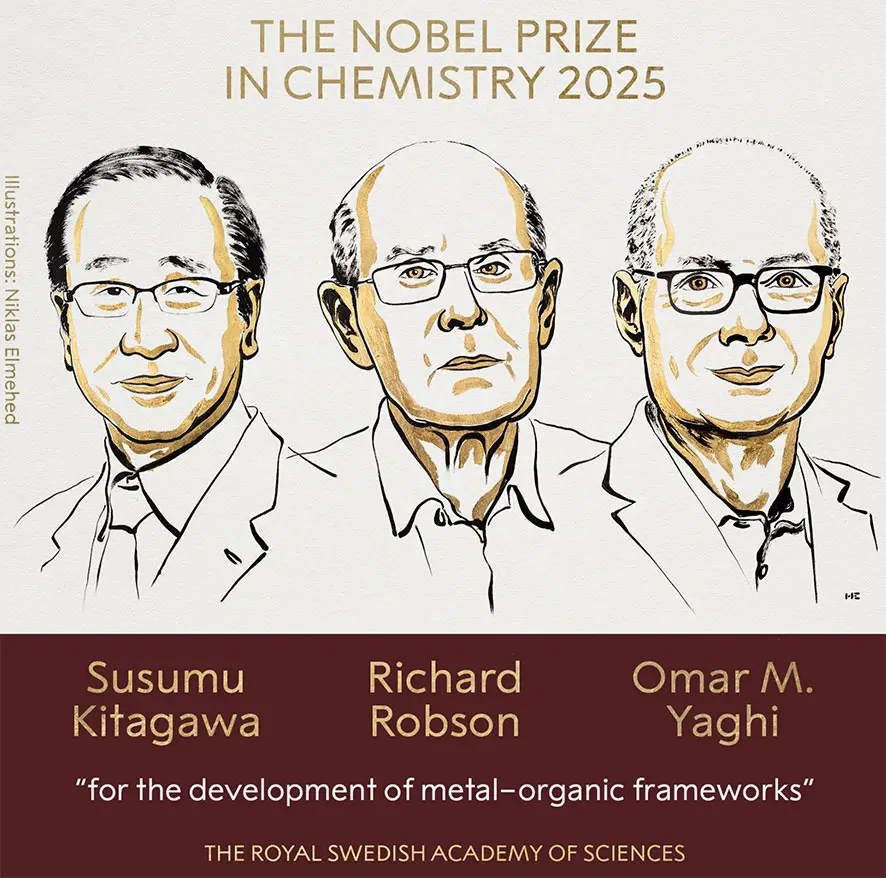On October 8, the Royal Swedish Academy of Sciences announced that the 2025 Nobel Prize in Chemistry was awarded to Susumu Kitagawa, Richard Robson, and Omar M. Yaghi for their development of metal-organic frameworks.

The three laureates will share the 11 million Swedish kronor prize, the same as in 2024.
The researchers reportedly developed a novel molecular structure that allows molecules to flow in and out. Researchers are using this structure to collect water from desert air, extract pollutants from water, capture carbon dioxide, and store hydrogen.
Susumu Kitagawa is a Japanese inorganic chemist and a special professor at Kyoto University. He received his doctorate from Kyoto University in 1979 and has long been engaged in research on coordination polymers and metal-organic frameworks.
In 2024, he also served as an academic representative from Kyoto University, presiding over the opening and closing ceremonies of the Tongji University-Kyoto University International Graduate Student Forum and participating in the guidance of academic presentations on carbon neutrality.
Richard Robson was born in Glasgow, England, in 1937. He received his Ph.D. from the University of Oxford, England, in 1962. He is currently a professor at the University of Melbourne, Australia.
Richard Robson has played a pioneering role in two major areas of inorganic chemistry. Both involve the design of molecular organizations to achieve unusual functional or structural outcomes. The first was the synthesis of macrocyclic ligands capable of binding multiple metal ions, which can then act in a coordinated and catalytic manner. These systems mimic enzyme catalysis, and this work has inspired numerous similar studies around the world.
The second development is the strategy of using these dinuclear, tetranuclear, and polynuclear systems to construct infinite network materials, which may be future microporous catalysts. This type of crystal engineering and design has pointed the way to a fruitful new field in solid-state synthesis, now emulated by many others.
Omar Yaghi was born in Amman, Jordan, in 1965. He is a Jordanian-American chemist and a member of the U.S. National Academy of Sciences. He is currently the James and Neeltje Tretter Professor of Chemistry at UC Berkeley and an Honorary Professor at Tsinghua University.
Omar Yaghi received his Ph.D. from the University of Illinois at Urbana in 1990 and began postdoctoral research at Harvard University the same year. He became an Assistant Professor at Arizona State University in 1992, a Professor at the University of Michigan in 1999, and a Professor at the University of California, Los Angeles in 2006. Since 2012, he has been the James and Neeltje Tretter Professor at the University of California, Berkeley, and a Scientist at the Lawrence Berkeley National Laboratory.
In January 2022, the Institute of Nuclear and New Energy Technology at Tsinghua University appointed Omar Yaghi as an Honorary Professor at Tsinghua University. In June 2024, he received the Sixth Tang Prize for Sustainable Development.
Omar Yaghi and his research team pioneered two major research fields: metal-organic frameworks (MOFs) and covalent organic frameworks (COFs). These crystalline porous materials, due to their ultra-high surface area and highly defined atomic-scale structures, have not only become a hot topic in chemistry research over the past 20 years but have also provided a range of novel solutions to major challenges in the global energy and environmental fields, such as clean energy (hydrogen and methane) storage, carbon dioxide capture, sand-to-water extraction, and heterogeneous catalysis.
Notably, Professor Yaghi has been nominated for the Nobel Prize in Chemistry multiple times since 2006 for his pioneering contributions to network chemistry.
Omar Yaghi has published over 270 academic papers, 29 of which have been published in Science and Nature, generating over 137,000 citations. In 2006, he was named one of the "Top Ten Outstanding American Scientists" by Popular Science magazine.
